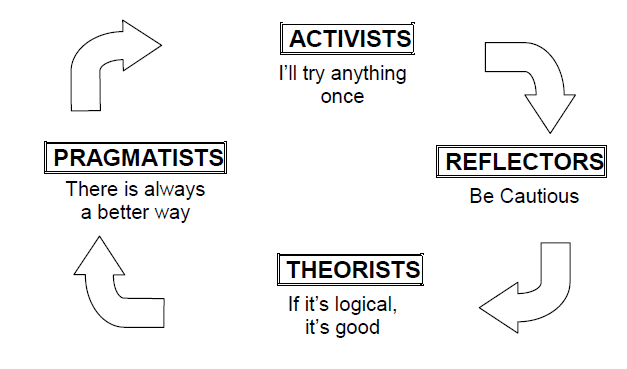
Jim Nichols – Honey and Mumford learning cycle
Jim talked about moving on from the VAK (Visual Auditory Kinesthetic) method of teaching towards the learning styles highlighted by Honey and Mumford. The four different ways in which people prefer to learn that they identified, relate to a different stage in the learning cycle. These are Activist, Reflector, Theorist and Pragmatist.
In this model the learning styles are described as a continuum that one moves through over time. However, over time, people usually come to prefer and rely on one, or more, style(s) above the others. Research has shown that there is no evidence that one preference is better than another – indeed the diversity of our learning styles adds value to team work and organisational functioning.
Activists – involve themselves fully and without bias in new experiences. They enjoy the here and now and are happy to be dominated by immediate experiences.
Reflectors – like to stand back to ponder experiences and observe them from many different perspectives. They collect data, both first-hand and from others, and prefer to analyse them thoroughly and think about them from every possible angle before coming to any definite conclusions.
Theorists – like to analyse and synthesise. They assimilate and convert disparate facts and observations into coherent, logical theories. Their philosophy prizes rationality and logic above all.
Pragmatists – are keen on trying out ideas, theories and techniques to see if they work in practice. They search out new ideas and take the first opportunity to experiment with applications.
John Ward – What is learning and what is the process of learning?
The habituated mind implies the absence of thought. Experience is our greatest teacher
5 stages of learning:
Learning is initiated when some dilemma or tension appears regarding a problem or surprising experience
Learning derives from experience and, in particular, from experiences in which mistakes were made
Learning almost always involves change which begins by acknowledging the dilemma or tension and the doubt regarding the efficacy of proposed action that intimates learning behaviour
Learning involves reframing
Reframing is the process of reinterpreting the world in light of alternative perspectives and values; reframing involves seeing problems in a different way and reconfiguring knowledge.
The habituated mind (of settled beliefs) is exposed to surprise or doubt which unsettles our beliefs which leads to enquiry, training and practice – within Aikido we have to trust and accept the martial system as a framework for our enquiry. From here we can fix our beliefs which leads to revised settled beliefs…and so it goes.
In martial arts we go from the Child mind (open and curious) to the Beginner’s mind (willingness to trust and practice) to the Learner’s mind (going through the iterative process above) to the Sceptical mind (Sandan crisis) to No mind.
Mike Vanderdonk – Process, Learning, Practice and Skill
Once you have a well-defined process, being able to apply the process to differing content becomes easy.
Learning is ‘getting’ the process – this can involve experimentation
Practice is then applying that process again and again with different content in different environments.. and as you progress in your expertise you can do this with different destabilisations – start adding more interesting things to the mix, to make it more challenging (making the process or practice harder and harder)
Training is teaching that process then stabilising the environment for the learner.
Skill is applying the correct process to the presented content.
